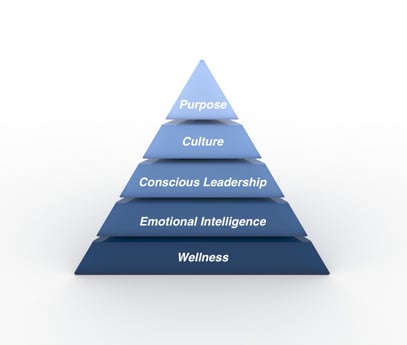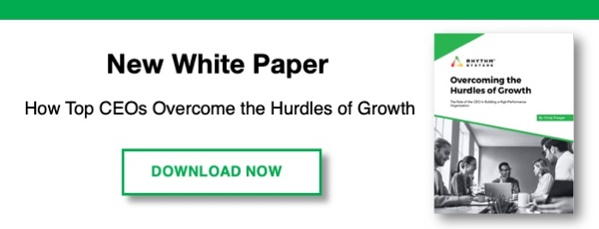When I was in college, I took a course called “The Meaning of Work” and enrolled in a  corresponding internship program following the course. As part of the program, I met weekly with a small group to discuss the work we were doing and reflect on its meaning. I earned a minor in “Faith and Work” as a result and gained experience in the non-profit sector and higher education through my internships. As a Millennial, I was fully indoctrinated in the belief that where I spend the majority of my waking hours should be meaningful in some way and, like many in my cohort, I entered the workforce craving something deeper than a paycheck. As they say, life happens, and my career hasn’t been what I imagined it would be as a 22-year-old college graduate (no surprise there!). But, I do still believe in the importance of finding meaningful work, the critical nature of doing work that matters, that has some purpose deeper than feeding my family and paying the bills. And the research backs me up on this, too.
corresponding internship program following the course. As part of the program, I met weekly with a small group to discuss the work we were doing and reflect on its meaning. I earned a minor in “Faith and Work” as a result and gained experience in the non-profit sector and higher education through my internships. As a Millennial, I was fully indoctrinated in the belief that where I spend the majority of my waking hours should be meaningful in some way and, like many in my cohort, I entered the workforce craving something deeper than a paycheck. As they say, life happens, and my career hasn’t been what I imagined it would be as a 22-year-old college graduate (no surprise there!). But, I do still believe in the importance of finding meaningful work, the critical nature of doing work that matters, that has some purpose deeper than feeding my family and paying the bills. And the research backs me up on this, too.
Studies have found that “employees who derive meaning and significance from their work are much more likely to stay with organizations."
But, what exactly do I mean when I say “purpose”? Purpose can mean many things - your company probably has a Core Purpose, you may have a personal purpose for your life, and we talk about “common purpose” as one of the 5C’s of Team Accountability. I’ll say more about that later.
For now, I want to focus on the personal sense of purpose that we all bring into our lives and to our work - the feeling that we are contributing in some meaningful way through the investment of our talents and our time in something that matters. There’s a common misconception about this kind of purpose - that it is only something people who work in non-profits or for corporations with specific social responsibility programs can achieve. Truthfully, you can find purpose in any job if you approach it with the right mindset. An article in Harvard Business Review describes three possible mindsets we bring to our work:
- Job mindset. When someone has a job mindset, they resort to a “paycheck mentality,” performing their duties in return for compensation and not much else.
- Career mindset. This mindset occurs when an individual is focused on increasing or advancing their salary, title, power, team size, or sphere of control.
- Purpose mindset. Feeling passionate, innovative, and committed are hallmarks of this mindset, as is having an outward-looking focus on serving the broader organization or key stakeholders. Your professional purpose feels aligned with your personal purpose.

These mindsets remind me a lot of a favorite parable of Patrick Thean, Rhythm Systems CEO. He loves to tell the story about the architect who asks construction workers what they are doing. The first answers “laying bricks” (the job mindset), the second answers "building a wall" (career mindset), and the third answers “building a cathedral” (purpose mindset). Even the most engaged and passionate workers aren’t in the purpose mindset all the time, but life is short, so we should strive to spend as much time there as possible.
While it is the responsibility of each individual worker to come withWe the willingness and commitment to create purpose and engagement in their jobs, to take ownership of their lives and their happiness, it is the responsibility of you, as a leader in the company, to create an environment in which your team members can thrive.
According to an article in Forbes, you can do a lot to lay the groundwork for a culture where employees can find meaning. There are some key components to consider:
Imagine a pyramid: The first element is a foundational requirement for the item above it. From the bottom up, wellness, emotional intelligence, conscious leadership and transformed cultures build toward the creation of an employee who gets more from their work than simply a salary -- a sense of meaning and purpose.

Coming back to my earlier statement about common purpose, one way to exercise conscious leadership is to establish accountability and empower your teams to act. A very concrete and practical first step that you can take as a leader is to help your teams understand the 'why' behind the work you are asking them to do. They can’t hope to find personal purpose if you keep them in the dark about why their work matters. Patrick talks about purpose in terms of the 3 whys - the answers to three questions leaders should always be prepared to share when rolling out a new initiative or project or plan:
- Why does it matter to our Company’s Core Purpose?
- Why does it matter to our Company’s core strategy?
- Why does it matter to me, personally?
Communicating the common purpose behind the work can help people feel more connected to the bigger picture. For leaders, it can be hard to remember to slow down and do this… to carefully communicate the why behind the new initiative or strategy to the rest of the company. But, doing this step does more than make your team feel warm and fuzzy about coming to work. If the people in your company have a deep understanding of the 3 whys, they are empowered to make better decisions that will get you closer to your goals.
For example, if you roll out a new dress code policy for everyone in your company to follow, you are likely to get some grumbles. But, you’ll be far more successful if you run this through the 3 whys and share the purpose of the change, how it will help your team better fulfill the company’s Core Purpose, how it helps you achieve a part of the longer term strategy (maybe you are striving to distinguish your company from the competition by being the most professional and polished in your industry), and how it will help each team member personally (maybe you share some research about how people pay closer attention to those who are professionally dressed and how the new dress code could increase their productivity and make them more personally successful).
Establishing a purpose-driven culture in your company isn’t just a tool to recruit and retain Millennials… it is a strategy that can actually help you achieve your growth goals faster and be more competitive. Create a company where everyone understands why their work is important, where they are empowered to make decisions based on the bigger picture, where they feel engaged, inspired and committed, and you will create an advantage that your competition will find hard to imitate.
If you enjoyed this post, check out these additional team accountability resources:
The Five C's of Team Accountability
Team Accountability Assessment
Team Accountability Begins with Personal Accountability
Building Team Accountability: Job Scorecards
10 Signs of an Accountable Culture [Infographic]
Growing Accountability in Your Organization
Quick Tips for Building Accountability
5 Steps to Having an Accountability Discussion [Video]
Learn more about accountable leaders and teams.
Photo Credit: iStock by Getty Images



